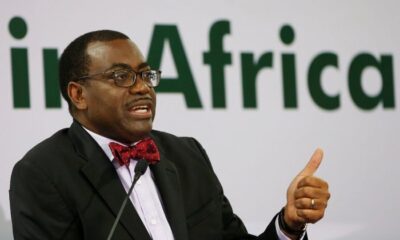Markets
2018: Rising Debt May Lead to Extra Burden, Say Experts
Published
7 years agoon

- 2018: Rising Debt May Lead to Extra Burden, Say Experts
Nigeria’s total debt stock rose by N8tn between September 2015 and September 2017. The country’s total debt stock as of the end of September 2017 stood at N20.37tn, while the debt as of the same period in 2015 was N12.36tn.
This means that within a period of two years, the country’s total debt exposure rose by N8.1tn. In terms of percentage increase, the country’s total debt rose by 64.81 per cent within the period.
Two years before, the external loan component of the country’s total debt stood at N2.09tn. However, as of September 30, 2017, the external debt component stood at N4.6tn. This means that the external debt component rose by N2.6tn or 124.4 per cent.
The domestic debt component of the total debt, on the other hand, rose from N10.27tn by September 2015 to N15.68tn in September of the year that just rolled over.
This means that within the two-year period, the domestic debt component rose by N5.41tn. In percentage terms, the domestic debt rose by 52.68 per cent.
Although the external component of the total debt increased by a higher proportion, statistics as of September showed that domestic debt, with its high cost of servicing, still dominated the country’s borrowing pattern.
The September debt status of the nation is not the final for the year as the country continued to borrow money from both local and foreign sources.
One of the major implications of the nation’s rising debt profile is the increasing burden of interest payment. This is especially true as the country has been making less money than before as a result of falling crude oil price in the international market.
In fact, the country’s debt sustainability has become an issue of debate as some experts have argued that Nigeria’s indebtedness is no longer sustainable.
The argument is that with reduced capacity to earn money, the country’s ability to service debt and repay the principal has been impacted. This, the arguments goes, has rendered the nation’s debt unsustainable even though the total debt to Gross Domestic Product ratio is still low.
The argument is simple. A man that earns N100,000 a month is in a better position to repay a N200,000 loan than a man who earns N20,000 a month but has a debt of N100,000 irrespective of whatever they have.
Recognising the country’s diminished income capacity and rising debt profile, the World Bank had advised Nigeria to ensure that it increased its income base or take more loans that come with less servicing commitments.
In practical terms, what the World Bank advised the government to do is to take less domestic loans and more foreign loans since domestic loans come with higher interest payment and have shorter tenors.
The Federal Government made a total of N3.49tn in domestic debt servicing payment between January 2015 and September 2017, investigation has shown.
In the same period, the country paid a total of $1.07bn (about N326.69bn) to service foreign loans obtained by both the federal and state governments.
This shows the wide gap between the size of the domestic borrowing and foreign borrowing, which has seen the government spending much of its revenues, especially during the just exited recession, on debt servicing.
Between October 2015 and September 2017, the Federal Government doled out N2.67tn to service local debts.
Breaking down the debt servicing payment, the Federal Government paid a total of N1.02tn for local debts in 2015. The amount grew to N1.23tn in 2016.
For the first nine months of the year 2017, the debt servicing obligation already exceeded that for the entire 2016 as the Federal Government had already serviced local debts to the tune of N1.24tn.
Most of the payments are for interests incurred on the funds borrowed monthly by the Federal Government using the instrument of FGN Bonds.
In 2016, the interest paid on FGN Bonds amounted to N839.17bn. In the same period, the interest on Nigeria Treasury Bills amounted to N335.58bn, while the interest paid on Treasury Bonds was N28.99bn. A total principal of N25bn was paid for Treasury Bonds.
Similarly, in the third quarter of 2017, interest payment on FGN Bonds accounted for N377.29bn, while that on NTBs amounted to N143.84bn. On Treasury Bonds, N9.38bn was paid; while N159.61m was paid on the new instrument, Savings Bonds.
The huge debt payment is a reflection of both the high interest on local debts as well as the size of the Federal Government’s domestic debt in comparison with foreign debt.
The trend is likely going to continue in 2018. A projection of the Debt Management Office actually shows that the debt service payment over a 10-year period, 2017 to 2026, will be $11.62bn on foreign debts alone.
The payments include some principals that must have fallen due for redemption as well as interests that would have accumulated and redeemed on annual basis.
Accordingly, 2018, 2021 and 2023 will see Nigeria parting with more than $1bn each of the years, because some Eurobonds issued by the Federal Government will fall due for redemption in each of the three years.
Thus, in 2018, the country will be parting with $1.19bn. This includes a principal redemption of $716.09m and an interest payment of $475.8m.
Showing that the trend of high debt servicing will continue this year, the Federal Government has earmarked N2.01tn for debt servicing in 2018.
The provision is 82.6 per cent of the estimates for capital projects. It is also 30 per cent of the projected revenue for the year. This is why some experts claim that the debt burden is hampering investment in infrastructure, which is so much needed by the nation.
Stakeholders, including the Lagos Chamber of Commerce and Industry, have described the provision for debt servicing this year as unsustainable.
Recognising the huge service payment on domestic debt, the Federal Government has yielded to the advice to borrow more from the foreign debt market and has plans to borrow $3bn from foreign sources in order to refinance some local debts.
The Director-General, DMO, Ms. Patience Oniha, said the new strategy would involve reducing the country’s domestic debt to 60 per cent, while raising the external component to 40 per cent.
“Going forward, the objective is to work towards achieving the 60:40 ratio in the way we mix our borrowing between domestic and external,” she stated.
By implication, this plan will also increase the country’s external borrowing by 16.57 per cent in order to raise the external component from 23.43 per cent to 40 per cent.
Economist and social commentator, Odilim Enwegbara, said the rising debt profile could actually scare foreign portfolio investors away from the nation’s economy. His argument is that the debt profile can crash the value of the local currency, a situation that portfolio investors will not like to see.
Enwegbara stated, “As it stands now, most potential foreign investors, especially portfolio investors, are increasingly avoiding our economy for the fear that our debt profile has the tendency of forcing the naira to collapse to the level that they may have difficulty exiting the naira whenever they feel to do so.
“Consumption debts that were never subjected to full-blown debt sustainability analysis are burdening the economy.”
The Head of Social Action (Abuja), a non-governmental organisation, Mrs. Vivian Bellonwu-Okafor, said that the nation’s rising debt profile held a gloomy prospect for the economy.
She stated, “The ballooning profile of Nigeria’s indebtedness has remained most worrisome, particularly for the gloomy prospects it holds for the year 2018. It has indeed become most appalling that despite some seeming positive economic indicators (stable naira, improved oil output, rising oil price etc.), to support de-escalating debt, the reverse has been the case.
“Placed side by side the government’s claims of recovering billions of looted funds (both from home and abroad), plugging leakages in the system and cutting down governance costs, saving billions of dollars variously in external reserves, the ECA as well as the TSA accounts against the borrowing spree the government has been steadily on, including a latest staggering over $5bn to amorphously fund 2018 budget, it will be clear to any right-thinking person that it is either the government is operating an economic management system totally strange to economics itself, or it simply has an unknown agenda with capitalists club of creditors to enslave Nigeria in a debt trap.
“Ordinarily, even on a personal level, borrowing is usually a last resort when all other internal avenues have been exhausted. This is because of the harsh effects of borrowing if not very carefully managed.
“Nigerian administrations gleefully borrow at will and randomly with the least resort to caution or concern for the implications of same on both the economy and consequently, innocent ordinary Nigerians.”
She added, “The 2018 budget will be funded by borrowing. Add this to a staggering N19.6tn as the debt profile outstanding as of June 2017; one will clearly see that there is no hope of letting off steam in the hardship being experienced by Nigerians.
“It is thus sad that for a government that strongly campaigned on reducing the debt burden of Nigeria has not lifted a single finger to live up to this promise, but has on the contrary, greatly increased the burden.”
Bellonwu-Okafor expressed fear that the country might witness more cases of suicide by economically depressed and frustrated Nigerians.
Is the CEO and Founder of Investors King Limited. He is a seasoned foreign exchange research analyst and a published author on Yahoo Finance, Business Insider, Nasdaq, Entrepreneur.com, Investorplace, and other prominent platforms. With over two decades of experience in global financial markets, Olukoya is well-recognized in the industry.

You may like
-
Nigeria Joins BRICS as Partner Country, Strengthening Global South Cooperation
-
70 Million Poorest of The Poor Nigerians To Get N75,000 From FG
-
Nigeria Surpasses OPEC Quota with 1.51 Million bpd, Targets 2.06 Million in 2025
-
Global Investors Commit $7.6 Billion to Nigeria’s Development at AIF 2024
-
Nigeria-China Trade Strengthened as Grimaldi Introduces Direct Shipping Line
-
Nigeria’s GDP Records 3.46% Growth in Q3 Spurred by Non-Oil Sector













